| dc.description.abstract | From its inception, the primary focus of the field of Linguistic Landscape Studies has been the interplay between language and space, or language on display. Recently, however, scholars have begun to consider the human element of linguistic landscapes (LLs), and include the body in their work [See for example Stroud and Jegels (2014), Peck and Stroud (2015), Peck and Banda (2014)]. This thesis aims to contribute to the ongoing development of the field of linguistic landscape research from focusing primarily on text and signage to looking at linguistic and semiotic landscapes in relation to the body. The study does so by investigating how the semiotic and linguistic landscapes of the South African mosque influence Muslim women's perceptions about their bodies, their feelings of belonging in the mosque, and their ideas about Muslim womanhood. Several methodological tools are used to achieve this, including walking interviews with South African Muslim women,
photographs of signage and architecture from thirty South African mosques, and autoethnographic narratives and reflection. | en_US |

